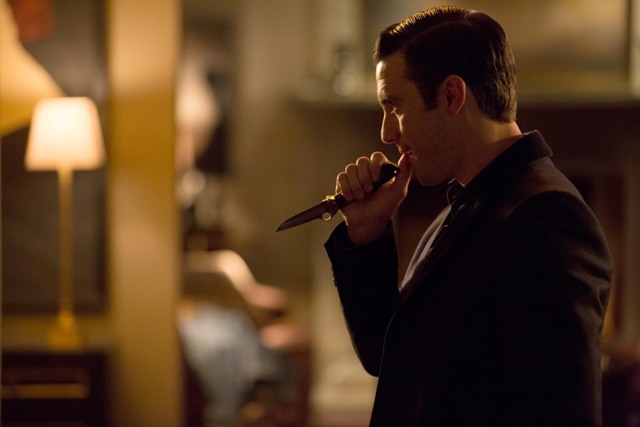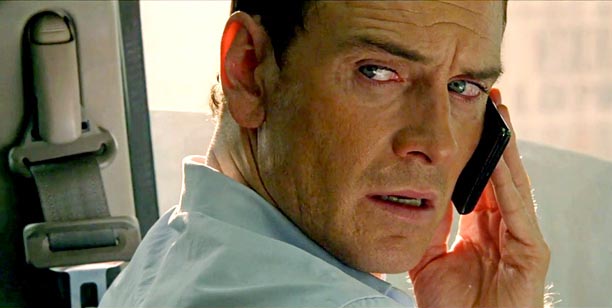 The Last Five Years
The Last Five Years
USA, 2015
Written by Jason Robert Brown
Directed by Richard LaGravenese
If you haven’t seen the film Pitch Perfect, you might not even know that Anna Kendrick can sing. The actresses’ pipes weren’t the key to her Oscar-nominated breakout in Up in the Air or most of the films she has done since. But in fact, singing was Kendrick’s first claim to fame: she started acting in New York at age 10 and received a Tony nomination at 12. Every ounce of that talent is on display in Richard LaGravenese’s new musical The Last Five Years, and the film needs her, because its unusual mix of bitter and sweet wouldn’t connect as well without her.
Kendrick plays Cathy, a struggling New York actress who learns in the opening scene that her husband Jamie (Jeremy Jordan, a Broadway veteran who appeared in the NBC series Smash) has left her. The film proceeds with two different timelines: Cathy’s part is told in reverse from the breakup back to the beginning, while Jamie’s story starts just after he met Cathy and moves forward. The two alternate songs, back and forth, meeting only in the middle when the couple is married.
Stephen King once wrote that true love is boring, because everyone outside the relationship quickly gets sick of it. This is exactly why The Last Five Years‘ unique structure is important. Many of the emotions expressed in these songs might seem trite or hopelessly saccharine, if not for the fact that the entirety of the relationship is in play at all times. Without foreknowledge that the relationship was doomed to fail, listening to Kendrick accept a marriage proposal by belting out the couplet “I want to be your wife / I want to have your child” might seem to be trying too hard; instead, the knowledge gives the moment an unusual power. Similarly, watching Jamie cheat on Cathy later on might be the ultimate in selfish-jerk moves, except that we have seen how dedicated he was to her in their early days together.
 Kendrick carries this film. Cathy’s songs are more difficult, and her struggle will be more real for most people in the audience – Jamie’s stress comes from being a far-too-successful author at a far-too-young age, which is not exactly relatable. It’s Kendrick’s voice that most often delivers both the bitter and the sweet in the film’s best songs, to the point that it’s easy to lose track of which timeline one is in: her performance is so forceful that Jordan’s decent work in the songs following hers can be overshadowed.
Kendrick carries this film. Cathy’s songs are more difficult, and her struggle will be more real for most people in the audience – Jamie’s stress comes from being a far-too-successful author at a far-too-young age, which is not exactly relatable. It’s Kendrick’s voice that most often delivers both the bitter and the sweet in the film’s best songs, to the point that it’s easy to lose track of which timeline one is in: her performance is so forceful that Jordan’s decent work in the songs following hers can be overshadowed.
It’s possible that Jason Robert Brown, who wrote and composed the Off-Broadway play being adapted here, intended it to be that way. The film is based on a failed marriage of his own – the ex-wife in question sued him over the film’s similarities to real life – and so the film constantly battles the danger of sympathizing too much with Jamie, the author’s surrogate. Brown does well to show that Cathy faces the more difficult struggle here, but he also has very little to say about whether Jamie made those struggles more difficult or not. The amount of blame that this story is willing to put on Jamie is an interesting question, open for debate by couples who see this film together; does a song like “If I Didn’t Believe in You” paint him as a supporting husband whose wife is pushing him away, or a man living in a fantasy that his wife has to be “saved” or “rescued” instead of simply loved?
Writer/director Richard LaGravenese is best known for his screenplays (The Fisher King, among many others) and it shows. There simply isn’t much to distinguish this film visually, and too often the camera gets in the way. The first song, “Still Hurting,” is a good example of this, as the camera moves far too much for a song so somber. More than once – including a key moment set during a sunset at the end of the movie – the power of the songs is sapped by an eye-rollingly manipulative camera shot.
Still, LaGravenese understands what his most potent weapons are, and employs them well. If you or your date are the sort of people who want a little bitter with the sweet, who finds Valentines’ Day to be a greeting-card slogan of a holiday, who clamor for real relationships on screen, you could do far worse than The Last Five Years. Whatever this film’s flaws may be, Anna Kendrick’s voice has more than enough power to sweep them away.
-Mark Young





